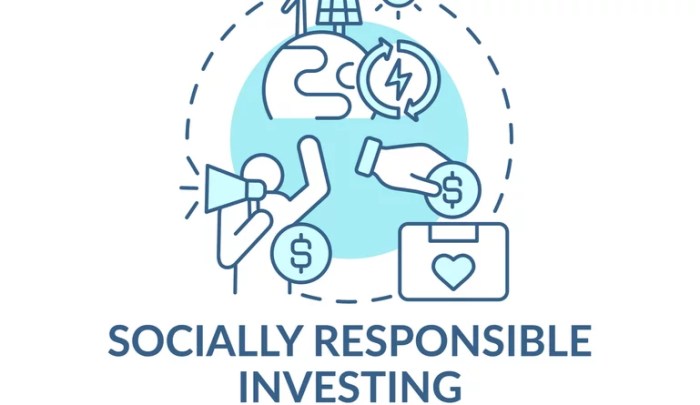With Socially responsible investing at the forefront, get ready for a deep dive into a world where money meets morals. Buckle up for a journey filled with ethical dilemmas, financial gains, and corporate responsibility.
Let’s explore what Socially Responsible Investing is all about and how it’s shaping the future of investment decisions.
What is Socially Responsible Investing?
Socially Responsible Investing (SRI) is an investment strategy that considers both financial returns and societal impact. It involves selecting investments based on ethical, environmental, social, and governance criteria. SRI aims to generate positive change by supporting companies that align with the investor’s values and beliefs.
Importance of Socially Responsible Investing
- Encourages responsible business practices: SRI encourages companies to operate in a socially responsible manner, promoting sustainability and ethical behavior.
- Aligns with investor values: SRI allows investors to support causes and issues they care about, such as environmental conservation, human rights, or diversity and inclusion.
- Long-term sustainability: Investing in socially responsible companies can lead to long-term financial success as these companies are often better equipped to navigate social and environmental challenges.
Examples of Companies Engaged in Socially Responsible Investing
- Patagonia: Known for its commitment to environmental sustainability, Patagonia invests in renewable energy, fair labor practices, and conservation efforts.
- Microsoft: Microsoft has made significant investments in diversity and inclusion initiatives, environmental sustainability, and community development projects.
- Unilever: Unilever focuses on sustainability and social responsibility by working towards reducing its carbon footprint, promoting fair trade practices, and improving access to hygiene and sanitation.
Principles of Socially Responsible Investing
Socially Responsible Investing (SRI) is guided by several key principles that set it apart from traditional investing. One of the main principles is the integration of environmental, social, and governance (ESG) factors into investment decisions. This means considering the impact that companies have on the planet, society, and how they are governed when selecting investments.
Ethical Considerations in Investment Decisions
When it comes to SRI, ethical considerations play a significant role in investment decisions. Investors who practice SRI often prioritize investing in companies that align with their values and beliefs. This could mean avoiding industries such as tobacco, weapons manufacturing, or businesses with poor labor practices.
Comparison with Traditional Investing
In contrast to traditional investing, where the main focus is on maximizing financial returns, SRI takes a broader approach by considering the social and environmental impact of investments. While traditional investors may overlook ESG factors, SRI investors believe that companies with strong sustainability practices are more likely to generate long-term value.
Strategies for Socially Responsible Investing

Socially Responsible Investing (SRI) involves various strategies that investors can utilize to align their investments with their values and beliefs while still seeking financial returns. Here are some common strategies used in SRI:
Positive Screening
- Positive screening involves selecting investments based on specific criteria that align with ethical, social, or environmental values. For example, investors may choose to support companies with strong sustainability practices or those promoting diversity and inclusion.
- Investors may also seek out companies that are leading in renewable energy technologies or have a track record of promoting human rights and fair labor practices.
Negative Screening
- Negative screening involves excluding investments that do not meet certain ethical or sustainability criteria. This could include avoiding companies involved in industries such as tobacco, weapons manufacturing, or fossil fuels.
- Investors may also steer clear of companies with poor environmental records, human rights violations, or unethical business practices.
Impact and Benefits of Socially Responsible Investing
Socially Responsible Investing (SRI) has a significant positive impact on society by promoting ethical practices, sustainability, and social justice. By investing in companies that prioritize environmental and social responsibility, investors can drive positive change and contribute to a more equitable and sustainable world.
Positive Impact on Society
- SRI encourages companies to adopt sustainable business practices, reduce their carbon footprint, and support social welfare initiatives.
- Investing in SRI funds can help address pressing social issues such as climate change, human rights violations, and diversity and inclusion.
- By directing capital towards responsible companies, SRI investors can influence corporate behavior and promote transparency and accountability.
Financial Benefits of SRI
- Research has shown that companies with strong environmental, social, and governance (ESG) practices tend to outperform their peers financially in the long run.
- SRI investments can provide competitive returns while aligning with investors’ values and ethical beliefs.
- Reducing exposure to companies with poor ESG performance can help mitigate risks related to reputation damage, regulatory fines, and lawsuits.
Influence on Corporate Behavior
- Companies that receive investments from SRI funds are incentivized to improve their ESG performance to attract more socially conscious investors.
- SRI can lead to greater corporate transparency, responsible supply chain management, and increased focus on stakeholder engagement.
- Through shareholder advocacy and active ownership, SRI investors can engage with companies to drive positive change and hold them accountable for their impact on society and the environment.
